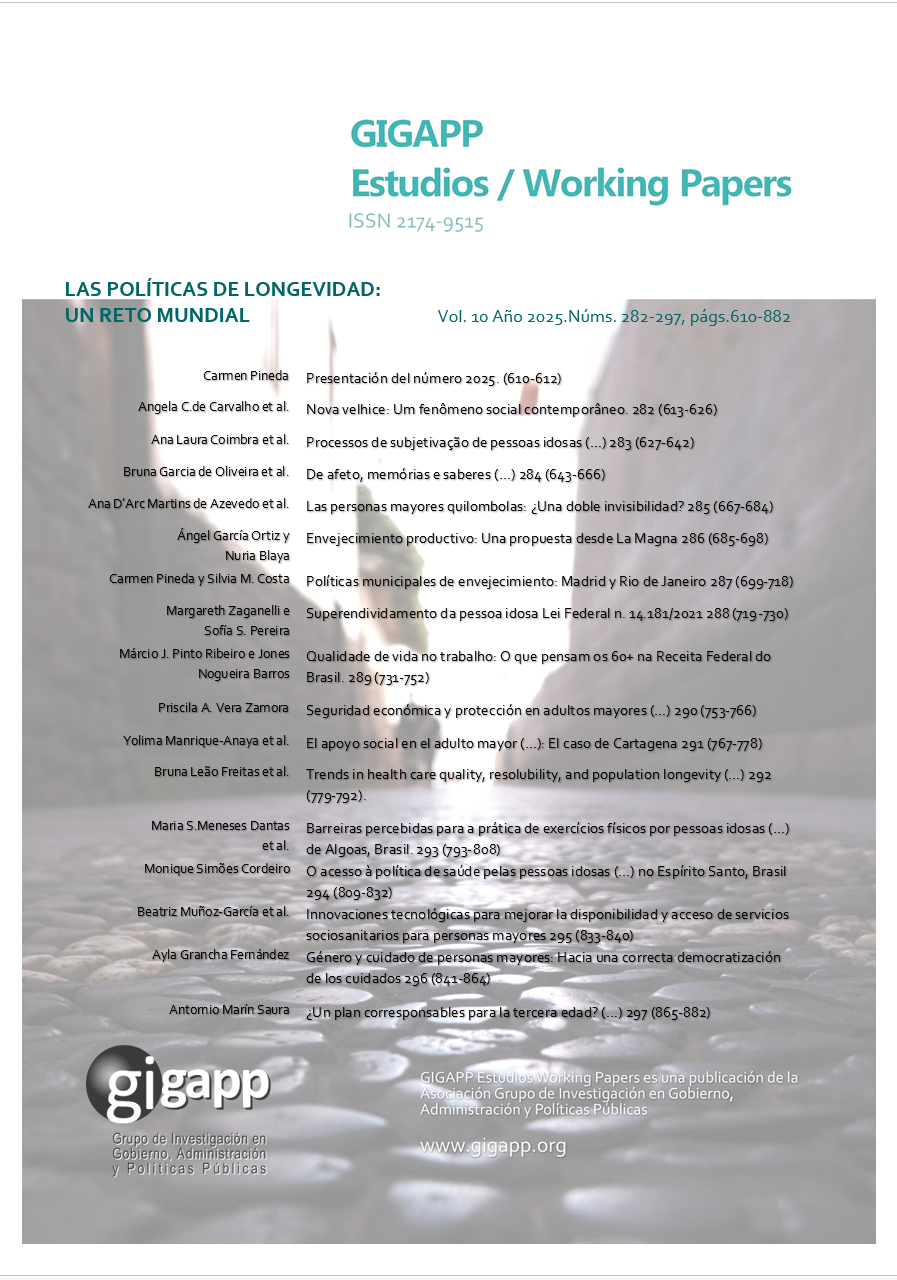Trends in health care quality, resolubility, and population longevity in Brazil, 1998-2019
Resumen
El presente estudio investiga las asociaciones entre las dimensiones de calidad y la resolubilidad de la atención primaria de salud en Brasil, según grupos de edad. Este estudio comprende un análisis cuantitativo de datos de encuestas transversales representativas a nivel poblacional en 2008, 2003, 2008, 2013 y 2019. Los resultados indican una asociación positiva entre la evaluación de la buena calidad de la atención médica y la resolubilidad, con mayores efectos en adultos que en personas mayores. Por el contrario, el buen estado de salud presentó un menor efecto en la calidad de la atención médica en adultos que en personas mayores. La multimorbilidad y la asistencia a centros públicos mostraron efectos negativos en la evaluación de la calidad de la atención médica en adultos y personas mayores. Los hallazgos mostraron que el aumento de la longevidad de la población, la resolubilidad de la atención médica, el estado de salud, la multimorbilidad y la asistencia a centros públicos de salud se asocian con la percepción de la calidad de la atención médica en Brasil. El estudio contribuye a la literatura sobre la asociación entre la calidad y la resolubilidad de la atención médica, abordando cuestiones emergentes relacionadas con la transición demográfica.
Descargas
Citas
Baldwin, W., 2020. What’s changing the world? A demographer’s perspective, in: J. Singelmann, J., and D. Poston Jr., eds., Developments in demography in the 21st century. Cham: Springer. doi: http://www.doi.org/10.1007/978-3-030-26492-5_2 .
Bilger, J., Pletscher, M., and Müller, T., 2024. Separating the wheat from the chaff: How to measure hospital quality in routine data?. Health Serv Res. 59: e14282. doi: https://www.doi.org/10.1111/1475-6773.14282 .
Bitton, A., Ratcliffe, H.L., Veillard, J.H. et al., 2017. Primary health care as a foundation for strengthening health systems in low- and middle-income countries. J Gen Intern Med. 32(5): 566-571. doi: https://www.doi.org/10.1007/s11606-016-3898-5 .
Britnell, M., 2015. In search of the perfect health system. London: Palgrave Macmillan. 247p.
Cerda, A. A., García, L. Y., Rivera-Arroyo, J., et al., 2022. Comparison of the healthcare system of Chile and Brazil: strengths, inefficiencies, and expenditures. Cost Eff Resour Alloc. 20: 71. doi: https://www.doi.org/10.1186/s12962-022-00405-9 .
Donabedian, A., 2005. Evaluating the quality of medical care, Milbank Q. 83(4): 691-729. doi: https://www.doi.org/10.1111/j.1468-0009.2005.00397.x .
Doubova, S. V., Guanais, F. C., Pérez-Cuevas, R., et al., 2016. Attributes of patient-centered primary care associated with the public perception of good healthcare quality in Brazil, Colombia, Mexico and El Salvador. Health Policy Plan. 31(7): 834-843. doi: https://www.doi.org/10.1093/heapol/czv139 .
Goodrich, G.W., and Lazenby, J.M., 2023. Elements of patient satisfaction: an integrative review. Nursing Open. 10: 1258-1269. doi: https://www.doi.org/10.1002/nop2.1437 .
Houghton, N., Bascolo, E., and del Riego, A., 2020. Monitoring access barriers to health services in the Americas: a mapping of household surveys. Rev Panam Salud Publica. 44: e96. doi: https://www.doi.org/10.26633/RPSP.2020.96 .
Huber, C. A., Scherer, M., Rapold, R., et al., 2020. Evidence-based quality indicators for primary healthcare in association with the risk of hospitalisation: a population-based cohort study in Switzerland. BMJ Open. 10: e032700. doi: https://www.doi.org/10.1136/bmjopen-2019-032700 .
Lima, J. G., Giovanella, L., Fausto, M. C. R., et al., 2018. Essential attributes of primary health care: national results of PMAQ-AB. Saude Debate. 42(spe 1): 52-66. doi: https://www.doi.org/10.1590/0103-11042018S104 .
Lopus, S., 2024. The demographic transition, with data from Brazil. Socius. 10: 1-3. doi: https://www.doi.org/10.1177/23780231241259620 .
Moreira, L., Lima, J. V. M. T., Silvestrini, M. M., et al., 2024. Determinants of government expenditures with health insurance beneficiaries in the Brazilian health system. Healthcare. 12: 2335. doi: https://www.doi.org/10.3390/healthcare12232335 .
Nishijima, M., Sarti, F. M., and Schor, A., 2020. Results of primary health care intervention for prevention of hospitalizations and mortality due to hypertension in Brazil, 2000-2015. J Public Health. 28: 469-478. doi: https://www.doi.org/10.1007/s10389-019-01020-4 .
Nishijima, M., Sarti, F. M., Vodenska, I., et al., 2019. Effects of decentralization of primary health care on diabetes mellitus in Brazil. Public Health. 166: 108-120. doi: https://www.doi.org/10.1016/j.puhe.2018.10.005 .
Pullicino, G., Sciortino, P., Calleja, N., et al., 2015. Comparison of patients’ experiences in public and private primary care clinics in Malta. Eur J Public Health. 25(3): 399-401. doi: https://www.doi.org/10.1093/eurpub/cku188 .
Ruscitto, A., Mercer, S. W., Morales, D, et al., 2016. Accounting for multimorbidity in pay for performance: a modelling study using UK Quality and Outcomes Framework data. Br J Gen Pract. 66(649): e561-7. doi: https://www.doi.org/10.3399/bjgp16X686161 .
Sawicki, O. A., Mueller, A., Klaaßen-Mielke, R., et al., 2021. Strong and sustainable primary healthcare is associated with a lower risk of hospitalization in high risk patients. Sci Rep. 11(1): 4349. doi: https://www.doi.org/10.1038/s41598-021-83962-y .
Sekhon, M., Cartwright, M., and Francis, J. J., 2017. Acceptability of healthcare interventions: an overview of reviews and development of a theoretical framework. BMC Health Serv Res. 17(1): 88. doi: https://www.doi.org/10.1186/s12913-017-2031-8 .
Travassos, G. F., Coelho, A. B., and Arends-Kuenning, M. P., 2020. The elderly in Brazil: demographic transition, profile, and socioeconomic condition. Rev Bras Estud Popul. 37: e0129. doi: https://www.doi.org/10.20947/S0102-3098a0129 .
Trindade, L. A. I., Pereira, J. L., Leite, J. M. R. S., et al., 2024. Lifestyle and cardiometabolic risk factors associated with impoverishment due to out-of-pocket health expenditure in São Paulo City, Brazil. Int J Environ Res Public Health. 21(9): 1250. doi : https://www.doi.org/10.3390/ijerph21091250 .
Wong, S.Y.S., Kung, K., Griffiths, S.M., et al., 2010. Comparison of primary care experiences among adults in general outpatient clinics and private general practice clinics in Hong Kong. BMC Public Health. 10-397 doi: https://www.doi.org/10.1186/1471-2458-10-397 .
Zhou, M., Liao, J., Hu, N., et al., 2020. Association between primary healthcare and medical expenditures in a context of hospital-oriented healthcare system in China: a national panel dataset, 2012-2016. Int J Environ Res Public Health. 17: 6917. doi: https://www.doi.org/10.3390/ijerph17186917 .
Zulman, D. M., Asch, S. M., Martins, S. B., et al., 2014. Quality of care for patients with multiple chronic conditions: the role of comorbidity interrelatedness. J Gen Intern Med. 29: 529-537. doi: https://www.doi.org/10.1007/s11606-013-2616-9 .
Zurynski, Y., Ansell, J., Ellis, L. A., et al., 2021. Accessible and affordable healthcare? Views of Australians with and without chronic conditions. Intern Med J. 51(7): 1060-1067. doi: https://www.doi.org/10.1111/imj.15172 .
Derechos de autor 2025 Bruna Leão Freitas, Maria Luisa de Oliveira Collino Antiga, Flavia Mori Sarti, Dra. (Autor/a)

Esta obra está bajo licencia internacional Creative Commons Reconocimiento-NoComercial-CompartirIgual 4.0.
Aquellos autores/as que tengan publicaciones con esta revista, aceptan los términos siguientes:
a. Los autores/as conservarán sus derechos de autor y garantizarán a la revista el derecho de primera publicación de su obra, el cuál estará simultáneamente sujeto a la Licencia de reconocimiento de Creative Commons Attribution-NonCommercial-ShareAlike 4.0 International (CC BY-NC-SA 4.0) que permite a terceros compartir la obra siempre que se indique su autor y su primera publicación esta revista.
Con esta licencia de acceso abierto, los lectores (usuarios) pueden:
- Compartir — copiar y redistribuir el material en cualquier medio o formato
- Adaptar — remezclar, transformar y construir a partir del material
Bajo los siguientes términos:
-
Atribución — usarios deberán dar crédito de manera adecuada, brindar un enlace a la licencia, e indicar si se han realizado cambios. Puede hacerlo en cualquier forma razonable, pero no de forma tal que sugiera que usted o su uso tienen el apoyo de la licenciante.
-
NoComercial — usuarios no puede hacer uso del material con propósitos comerciales.
-
CompartirIgual — Si remezcla, transforma o crea a partir del material, usuarios deben distribuir su contribución bajo la misma licencia del original.
-
Sin restricciones adicionales: los usuarios no pueden aplicar términos legales o medidas tecnológicas que restrinjan legalmente a otros de hacer cualquier cosa que permita la licencia.
b. Los autores/as podrán adoptar otros acuerdos de licencia no exclusiva de distribución de la versión de la obra publicada (p. ej.: depositarla en un archivo telemático institucional o publicarla en un volumen monográfico) siempre que se indique la publicación inicial en esta revista
c. Se permite y recomienda a los autores/as difundir su obra a través de Internet (p. ej.: en archivos telemáticos institucionales o en su página web) antes y durante el proceso de envío, lo cual puede producir intercambios interesantes y aumentar las citas de la obra publicada. (Véase El efecto del acceso abierto).



